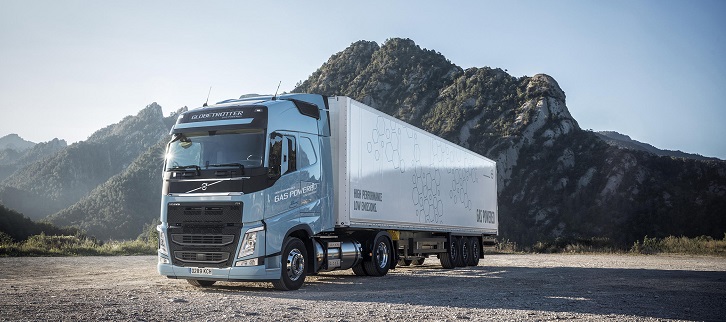Volvo launches FM and FH models powered by LNG

Volvo Trucks is introducing Euro 6-compliant FM and FH models that run on liquiefied natural gas (LNG) or biogas.
The company says that these trucks offer the same performance, driveability and fuel consumption as Volvo’s diesel-powered models. Furthermore, the new trucks’ CO2 emissions are 20–100% lower compared with diesel, depending on choice of fuel.
The new Volvo FH LNG and FM LNG are available with 420 or 460hp for heavy regional and long-haul operations. Volvo’s 460hp gas engine delivers maximum torque of 2300Nm while the 420hp version produces 2100Nm. This is the same as Volvo’s corresponding diesel engines. In addition, fuel consumption is on a par with Volvo’s diesel engines, but 15-25% lower than for conventional gas engines.
“With our new trucks running on liquefied natural gas or biogas, we can offer an alternative with low climate impact that also meets high demands on performance, fuel efficiency and operating range. This is a combination that our customers in regional and long haulage require,” said Lars Mårtensson, director Environment and Innovation at Volvo Trucks.
Instead of an Otto cycle engine, the conventional solution for gas-powered vehicles, the Volvo FH LNG and FM LNG are powered by gas engines utilising diesel cycle technology, so it doesn’t compromise driveability, fuel efficiency or reliability.
The fuel used is natural gas in the form of LNG or biogas, known as bio-LNG. Both fuels consist of methane. If biogas is used, the climate footprint can shrink by as much as 100% and if natural gas is used, the reduction is 20%.
The biggest fuel tank variant contains enough LNG for a range of up to 1000km. Refuelling takes about the same time as filling up with diesel.
Volvo Trucks is working with gas suppliers and customers to expand the LNG infrastructure in Europe. This development is also being supported politically in many countries and by the EU.
“Natural gas offers clear climate upsides, it is competitively priced in many countries, and there are sufficient reserves to justify large-scale use. Our focus on LNG vehicles is creating new prerequisites for our customers to run fuel- and cost-efficient operations. At the same time, we’re making it possible for heavy truck operations to considerably reduce their climate impact,” says Lars Mårtensson.
The Volvo FM LNG and FH LNG go on sale in spring 2018. There will be 6 versions available: 4×2, 6×2 and 6×4 tractors, along with 4×2, 6×2 and 6×4 rigids with gross vehicle weights of up to 64 tonnes for regional and long-haul operations.
